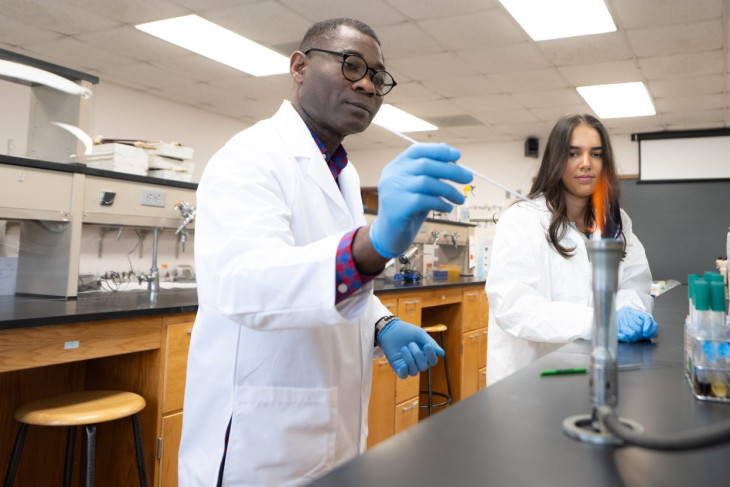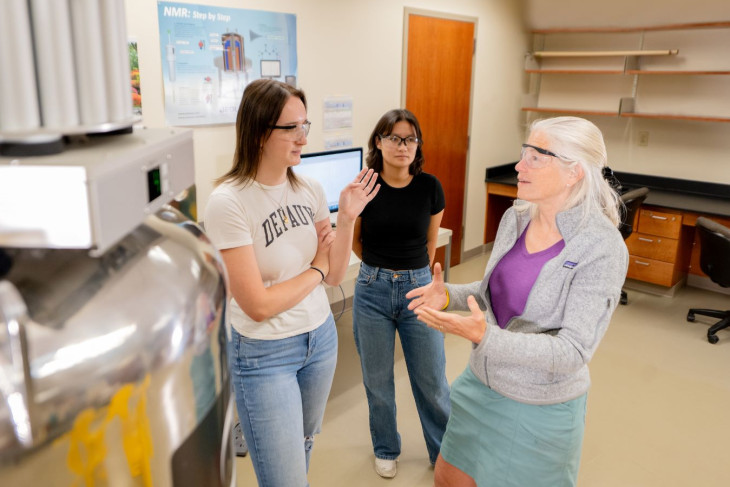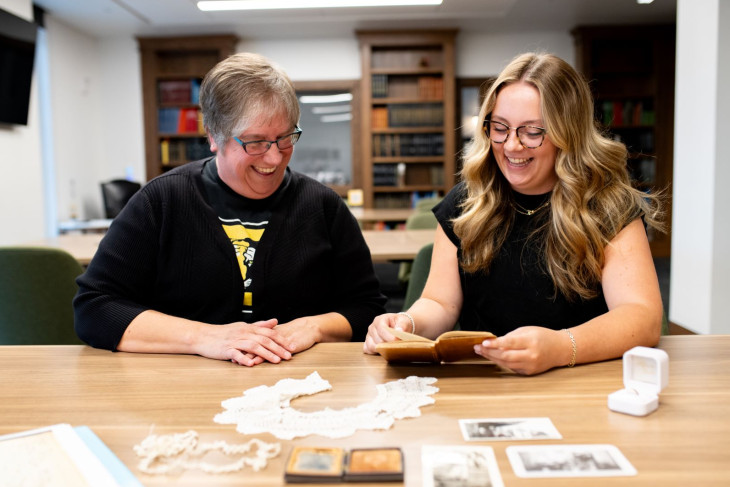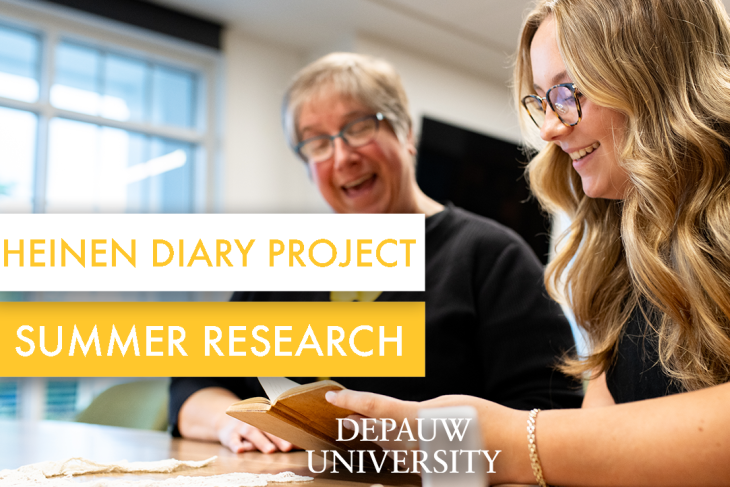When Thi Doan ’27 applied for a 2024 summer research position with biology professor Philips Akinwole, she was unsure what to expect. As a first-year student in the beginning stages of her academic career, Doan knew the role would come with a steep learning curve. “I was new to many of the lab skills,” she admits. “But I wanted to give summer research a try. I think putting effort into something is the best way to show determination.”
She soon discovered that this determination was exactly what Professor Akinwole was looking for. Having worked with several student researchers in the past, Akinwole knows what it takes to succeed in the lab. “The student has to really want to do this,” he explains. “I can’t force them. They need to put in the extra time and extra effort into their work to get a good result out of what they do.”
Doan rose to the challenge, spending the summer studying soil mites in an effort to assess the potential harmfulness of pollutants on a soil environment – a project that Akinwole has been leading for several years. The findings have brought fresh perspectives to important conversations within the scientific community, leading to conference presentations, student’s award, publication and collaborations with other labs and invitations for Akinwole to serve as a reviewer for new journal articles.
 Akinwole with Nina Shaffer '25
Akinwole with Nina Shaffer '25
Although the project’s scientific contributions are undeniably important, Akinwole is more focused on the platform it provides for him to invest in the next generation of researchers. “One of my goals is to prepare students for graduate school,” he explains. “I want to make sure they have the skills they need to be competitive and confident.”
In Doan’s case, the experience in the lab has been an ideal foundation for her future. She plans to continue developing her expertise as a researcher, eventually earning a PhD and teaching at a university. “It was a privilege to work with Professor Akinwole,” she says. “He taught me many skills that I will use in the lab and the classroom.”
Akinwole goes even one step further. “They’re not just getting lab skills, but also real life skills.” He pulls a hand-written card off the shelf behind his desk that was sent to him from a former student now working toward her PhD. “It makes me happy to see the positive impact of what I’m doing.”
Support for this project was made possible, in part, by the Kranbuehl Roberts Hillger Endowed Fund for Faculty Summer Research.
The advantage at DePauw is its small size and personal attention. I have an open policy. My students can walk in and ask questions anytime. It allows me to help them through an issue or give them guidance and mentorship.– Philips Akinwole, assistant professor of biology
“The Spiral of Learning”
While Thi Doan was busy studying soil mites in the Olin labs, Kate Walsh ’26 and Delaney Collier ’25 were across the street in Julian analyzing water molecules, analyzing the impact of inserting a small molecule into a space where a few hundred water molecules are confined. Their work, the most recent phase of an ongoing project led by Bridget Gourley, professor of chemistry and biochemistry, dean of the faculty and dean of the College of Liberal Arts and Sciences, explored questions of how small tweaks in those inserted molecules affect the behavior of water in the system.
In collaboration with researchers from Colorado State University, Gourley has been working on this project since 2020, thanks in large part to funding from the National Science Foundation. During that time, she has mentored an impressive group of students, delivering them a level of research exposure they wouldn’t otherwise have access to.

“At the undergraduate level, a student’s time is fractured during the school year,” Gourley notes. “But in summer research, they get ten weeks to focus on one thing and see what it’s like.” For Walsh and Collier, half of that time was spent in Greencastle before heading across the country to Fort Collins, where they teamed up with students at Colorado State.
The opportunity has been transformative for both of them, as they prepare for a new year at DePauw and the next chapter of their education. “This has been a really eye-opening experience,” says Walsh. “I’ve gained so much independence in the lab, and I’m more ready to apply the ‘why’ of what I’m doing there.”
Collier has a similar outlook. “Doing summer research has made me more confident as a person, both in the classroom and in the lab. I now have hundreds of hours of extra experience. I’ve been given skills that I’ll use for the rest of my life.”
Gourley describes this as the spiral of learning, a constant process of building on the skills students already have in order to reach new heights of understanding and expertise. “No matter how far along you are,” she points out, “you can keep growing and keep adding on. I experience the same thing, and I’ve been doing this for a long time. That’s the fun part of research.”
The curiosity required to do research has helped me find creative solutions to issues I've tackled so far in my career. Demonstrating to myself that I can learn and master new skills, equipment and instrumentation gave me confidence that I could do the same in my current position.– Jenna Deckard ’23, chemist at Elanco and former research student with Bridget Gourley
“History Personified”
Science labs, however, weren’t the only places where groundbreaking research was taking place during the summer months. Across campus at the Roy O. West Library, Laney Collier (no relation to Delaney) devoted her attention to a unique piece of history, the 1916 daily journal of Frederika Heinen.
Heinen is the great-great-grandmother of Caroline Gilson, DePauw’s science librarian. After working with another student last summer to study the 1864 diary of Ernst John Heinen, Frederika’s future husband and Caroline’s great-great grandfather, Gilson saw an opportunity to extend that work and give another student the opportunity to explore primary source material with unique historical significance.

“I’m a big believer in experiential learning,” Gilson explains. “My intent was to be open-ended with these projects and make them as self-directed as possible. It’s fun to see what details different people latch onto.”
Collier wasted little time latching onto Frederika Heinen’s practical – and often humorous – reflections. In writing about home-keeping, cooking, gardening, family and community life, the journal reveals a wealth of insights about daily life as a 70 year-old homemaker in rural Kansas. Collier soon found herself seeing the world through another set of eyes.
“Working with these diaries has made history personified for me,” she notes. “In studying history, it’s easy to get lost in knowing the facts of what happened. But being able to see a real person’s account and know that a real person has experienced those things has made all the difference. I feel connected to them, and it’s inspired me to look into my own family history.”
Assisting Gilson on this project has not only solidified Collier’s career trajectory, but it has also paid immediate dividends in her work as a volunteer at the Hendricks County Historical Museum. “It has been fun to take all the things I’ve been learning here and bring them with me to my work at the museum. I’m now familiar with so many different tools – maps, census records, plat books – and I can use those to help people find what they’re looking for.”
“In the Right Place”
With a variety of projects throughout campus and around the world, DePauw’s summer research opportunities place dozens of students each year at the forefront of innovation. The skills they learn are invaluable, but in many cases the focused time spent with faculty mentors gives them something even greater.
That was certainly the case for Hamayl Afzal ’22, currently a biochemistry graduate student at Duke University. Although her summer research experience was initially jeopardized by the COVID-19 pandemic, her professor Bridget Gourley helped her return to Greencastle from Pakistan so that she could take part in an earlier stage of the research that Gourley continues to conduct. The result was life-changing.
“The moment I stepped into Dr. Gourley’s lab, I knew I was in the right place,” she recalls. “That summer, I fell in love with science all over again and realized that this is what I wanted to do. My research with Dr. Gourley was one of the most important career decisions I made.”
Although DePauw is small, the opportunities it offers are immense.– Hamayl Afzal ’22, PhD student at Duke University and former research student with Bridget Gourley
Thi Doan can relate. As she enters her second year at DePauw, she plans to continue working in Professor Akinwole’s lab, building on the knowledge she has already accumulated.
“I think I found my passion,” she says. “When I first came to DePauw, I wasn’t sure what field I wanted to go into. But now, I’m more clear about the pathway I want for my future.”
Browse other stories
-
Athletics
-
Women's Track & Field - Porter Selected Academic All-America® for Second Straight Year
-
Women's Golf - Williams Selected Academic All-America®
-
Football - DePauw-Record 190 Student-Athletes Named to NCAC's Dr. Gordon Collins Scholar-Athlete Honor Roll
More Athletics
-
-
News
-
Outstanding scholars named to Spring 2025 Dean's List
-
Alumni News Roundup - June 6, 2025
-
Transition and Transformation: Inside the First-Year Experience
More News
-
-
People & Profiles
-
11 alums make list of influential Hoosiers
-
DePauw welcomes Dr. Manal Shalaby as Fulbright Scholar-in-Residence
-
DePauw Names New Vice President for Communications and Strategy and Chief of Staff
More People & Profiles
-
-
Have a story idea?
Whether we are writing about the intellectual challenge of our classrooms, a campus life that builds leadership, incredible faculty achievements or the seemingly endless stories of alumni success, we think DePauw has some fun stories to tell.
-
Communications & Marketing
101 E. Seminary St.
Greencastle, IN, 46135-0037
communicate@depauw.eduNews and Media
-
News media: For help with a story, contact:
Bob Weaver, Senior Director of Communications.
bobweaver@depauw.edu.
